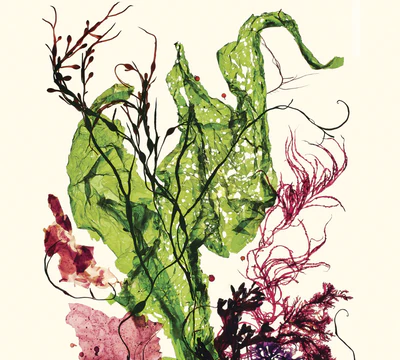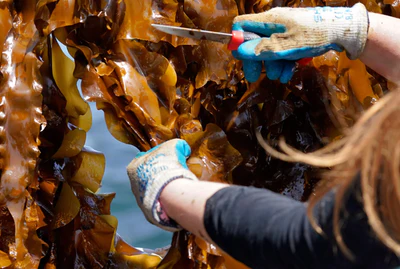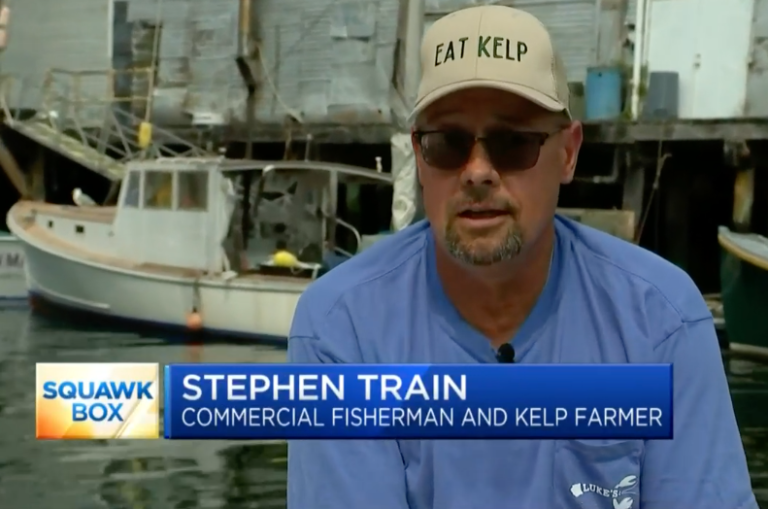WITH NEW RETAIL PRODUCTS, ATLANTIC SEA FARMS SEEKS TO EXPAND KELP MARKET

ATLANTIC SEA FARMSA kelp farm can produce three to seven pounds per foot of line. With up to 18,000 feet of line in the water, “that’s a lot of kelp,†said Atlantic Sea Farms CEO Briana Warner.
In partnership with 16 small kelp-growing operations along the Maine coast, Atlantic Sea Farms, in Saco, is looking to reach more consumers with a number of initiatives underway.
Atlantic Sea Farms was originally Ocean Approved, the nation’s first kelp farm, with farm operations off Portland and a processing facility in Saco. The term “ocean approved†will be retained as a branding seal, Atlantic Sea Farms CEO Brianna Warner told Mainebiz. Atlantic Sea Farms grows, processes and sells kelp and kelp products.
Warner became CEO of Ocean Approved last July. She had been senior community development officer at the Island Institute in Rockland, where she created a program that helped fishermen diversify into seaweed and shellfish aquaculture.
Since Warner took over, the company has changed its name, raised capital, expanded the number of partner farms it works with, built a sales team and developed retail products, she said.
The retail products will be available online within a week, she said. Atlantic Sea Farms’ website launched April 16.
Atlantic Sea Farms has almost doubled the number of partner farms over the past year.
Ocean Approved had previously developed ready-cut kelp and kelp cubes for the food service industry. New products since then include Sea-Chi, a fermented kimchi-like product; and Sea-Beet Kraut, a vegan probiotic sauerkraut. In development is Seaweed Salad.
VALUE-ADDED KELP
The products are available for the food service industry and for retail sales. Atlantic Sea Farms is the only company in the U.S. producing value-added kelp products at scale, Warner said. The packaging and website will include recipes. Overall, Warner said, the goal is to make it easy for consumers to incorporate kelp into their diets.
The company worked with Minnie Luong, the owner of Chi Kitchen Foods in Rhode Island, to develop the value-added products. Production will be at Atlantic Sea Farms’ Saco facility and at the Rhode Island facility.
The level of production depends on the amount of kelp harvested. The harvest season began last week.
“We’re at week two of the harvest season,†Warner said. “We’re not sure what it will look like for volume yet.â€
The kelp is frozen at the Saco facility within 24 hours of harvest. The company employs four full-time employees and additional employees during the production season.
The production process is proprietary.
The company has received its first orders from retail outlets. Retailers throughout Maine are accepting the product, she said. An e-commerce platform should be ready within the next two weeks.
“People should see them in retailers near them soon,†Warner said.
Warner said Atlantic Sea Farms will be marketing within food service channels, online and at retail outlets.
Relationships with the partner farms, from Portland to Eastport, came about through those previously developed by Ocean Approved plus her previous aquaculture program with the Island Institute.
Funding for the new initiatives came from $1.34 million raised in equity plus $630,000 in convertible debt, according to Maine Startup Insider.
The market may be ripe for kelp products.
“Right now there are very few seaweed products on the market that are easy for consumers to know what to do with,†she said. “Most of the seaweed is imported from Asia. It’s all dried, so it’s difficult for the home chef to know what to do with. There are creative snack products using seaweed, but none that make it easy for a home cook to incorporate into a dish. We think offering fresh versus dried and dehydrated products is significant for allowing kelp to taste that way it should.â€
Kelp is a nutritious product and good for the marine environment, Warner said. Kelp farming is also another way for fishermen and others to diversify their income.
Even small farms can grow kelp in great density.
“You can grow quite a bit of kelp within a small plot,†Warner said. “If you’re growing three to seven pounds per foot of line and you have 18,000 feet of line in the water, that’s a lot of kelp.â€
Work is underway to expand farm capacity.
“But we’re not looking for aggressive expansion of farms,†she added.





